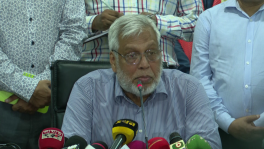Money laundering via trade invoicing 'shared failure' of banks, customs: NBR chairman
“To prevent under-invoicing, the NBR sets a minimum tariff value. But this ends up harming honest taxpayers,” he added.

National Board of Revenue (NBR) Chairman Abdur Rahman Khan has said money laundering through over- and under-invoicing is the result of a shared failure by banks and customs.
"There are many software and data agencies through which the international market price of any product can be easily verified. Banks can check the declared value of goods by comparing the amount for which LCs are being opened with the international market price," he said while speaking at a programme today (26 July).
"To prevent under-invoicing, the NBR sets a minimum tariff value. But this ends up harming honest taxpayers," he added.
Debate for Democracy organised the debate programme "Achieving Expected Revenue Collection is Possible Through Reforms in Tax Management" at the Bangladesh Film Development Corporation in the capital yesterday.
On revenue reform, the NBR chairman said creating separate wings for policy and management would not, by itself, increase revenue collection.
"To do that, we must ensure efficiency and transparency in tax administration. Just forming a reform committee is not enough. If recommendations are not implemented, revenue collection will not improve," Rahman further said.
He also said NBR suffers from a lack of policy implementation. "Political will is very important to ensure transparency and efficiency in NBR. Now, with full independence from government policymakers, including the chief adviser, it is possible to take bold decisions."
He stressed the use of technology to ensure transparency in revenue collection.
"Recently, we digitally selected 15,400 files for audit using a random method. The NBR is now placing emphasis on automation," he added.
Rahman also noted that over 5 lakh applicants have received services in under an hour through online applications via the Bangladesh National Single Window.
"Last year, 17.12 lakh TIN holders submitted returns online, and this year, online return submission is being made mandatory for all," he said.



 Keep updated, follow The Business Standard's Google news channel
Keep updated, follow The Business Standard's Google news channel
















